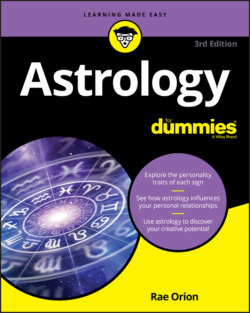Читать книгу Astrology For Dummies - Rae Orion - Страница 56
Wandering through Shakespeare’s star-crossed world
ОглавлениеIn the Renaissance, astrology saturated everyday life, so it’s no surprise that the plays of Williams Shakespeare (1564–1616) are pumped full of comets, eclipses, Suns, Moons, planets, and stars, few of which arrive without an adjective. In addition to being constant, blazing, shining, shooting, sparkling, wandering, fixed, and Earth-treading, Shakespeare’s stars are auspicious, charitable, chaste, comfortable, fair, favorable, glorious, good, happy, jovial, and lucky — or angry, bad, revolting, base, mortal, thwarting, homely, inauspicious, malignant and ill-boding. But astrology’s primary influence on Shakespeare is more than a matter of description. He thinks astrologically. His plays are shaped by signs (Scorpio and Macbeth; Cancer and A Midsummer Night’s Dream; Gemini and Romeo and Juliet). His characters are molded in the light of the four elements or modeled after planets such as quick-witted Mercury (Romeo’s friend Mercutio) or melancholy Saturn (King Lear). Even his plots are shaped by astrology. In Shakespeare’s plays, portents are never false alarms. When a prediction is uttered, it comes true. And while several characters speak against astrology and in favor of free will, those characters are not the ones we generally like. “The fault, dear Brutus, is not in our stars but in ourselves,” states Cassius in an oft-quoted remark. But Cassius is the one who has a lean and hungry look, the one who engineers the assassination of Caesar, and the one who — in a work of literature from another era — ends up in Dante’s ninth circle of hell along with Brutus, his fellow assassin, and Judas Iscariot: betrayers all.
Whether Shakespeare believed in astrology personally is probably unknowable. That he knew astrology is without question. In All’s Well That Ends Well, two characters even josh about the effect of retrograde Mars. Shakespeare found in astrology an organizing principle — and an opportunity for humor. “Saturn and Venus this year in conjunction!” says Prince Hal in Henry IV Part II as he watches an aging Falstaff romance a saucy wench. As Priscilla Costello points out in Shakespeare and the Stars, everyone would have caught the planetary references and laughed; it was a bit of a dirty joke. Shakespeare was a man of his times.
I’ve seen almost every Shakespeare play, and I’ve read them all. But not until I discovered Priscilla Costello’s miraculous book, Shakespeare and the Stars: The Hidden Astrological Keys to Understanding the World’s Greatest Playwright (Ibis Press, 2016) did I understand the magnitude of astrology’s influence on the bard. A must-read.
